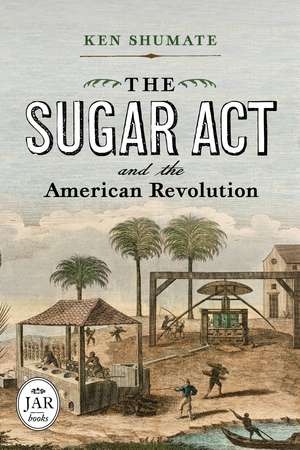The Sugar Act and the American Revolution: Journal of the American Revolution Books
Autor Ken Shumateen Limba Engleză Hardback – 19 dec 2022
The Sugar Act and the American Revolution by Ken Shumate is the only book-length treatment of this first great challenge of the revolutionary era. For each of the three incarnations of the act, the author provides a clause-by-clause description, including the British reasoning behind the duties and trade restrictions, and a summary of the resulting American grievance. Following the explanation of each act are chapters describing the protests of American merchants and popular leaders, and the British response to those protests. As a consequence of further parliamentary acts of taxation, the story ends with the demand in 1774 by the First Continental Congress for Parliament to repeal the Sugar Act as being “essentially necessary in order to restore harmony between Great Britain and the American colonies.”
Preț: 149.84 lei
Nou
Puncte Express: 225
Preț estimativ în valută:
28.69€ • 29.43$ • 24.15£
28.69€ • 29.43$ • 24.15£
Carte indisponibilă temporar
Doresc să fiu notificat când acest titlu va fi disponibil:
Se trimite...
Preluare comenzi: 021 569.72.76
Specificații
ISBN-13: 9781594163968
ISBN-10: 1594163960
Pagini: 232
Ilustrații: 4
Dimensiuni: 152 x 229 x 23 mm
Greutate: 0.4 kg
Editura: Westholme Publishing, U.S.
Colecția Westholme Publishing
Seria Journal of the American Revolution Books
ISBN-10: 1594163960
Pagini: 232
Ilustrații: 4
Dimensiuni: 152 x 229 x 23 mm
Greutate: 0.4 kg
Editura: Westholme Publishing, U.S.
Colecția Westholme Publishing
Seria Journal of the American Revolution Books
Recenzii
“Shumate’s careful account of the Sugar Act offers fresh insight . . . a welcome addition to the scholarship of the American Revolution because of the ways it complicates our understanding of the coming of independence.”—John Gilbert McCurdy, author of Quarters: The Accommodation of the British Army and the Coming of the American Revolution, Professor of History at Eastern Michigan University
Notă biografică
Ken Shumate is author of 1764: The First Year of the American Revolution. An independent researcher specializing in the early years of the American Revolution, with a particular emphasis on parliamentary taxation, he has also written about science, engineering, and software development issues, a magazine column on software design techniques, and five popular books.
Descriere
The Sugar Act and the American Revolution by Ken Shumate is the only book-length treatment of this first great challenge of the revolutionary era. For each of the three incarnations of the act, the author provides a clause-by-clause description, including the British reasoning behind the duties and trade restrictions, and a summary of the resulting American grievance. Following the explanation of each act are chapters describing the protests of American merchants and popular leaders, and the British response to those protests. As a consequence of further parliamentary acts of taxation, the story ends with the demand in 1774 by the First Continental Congress for Parliament to repeal the Sugar Act as being “essentially necessary in order to restore harmony between Great Britain and the American colonies.”












